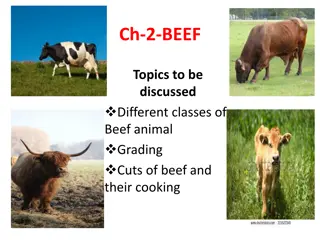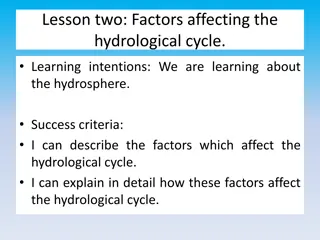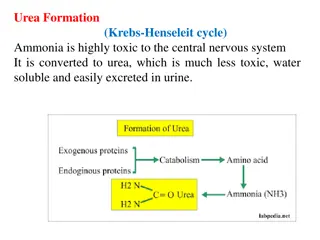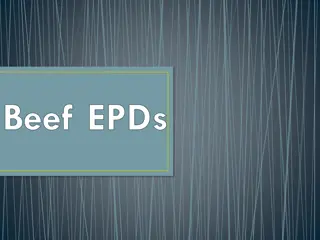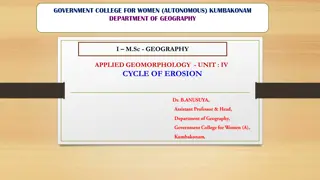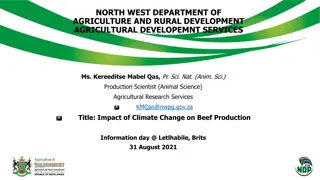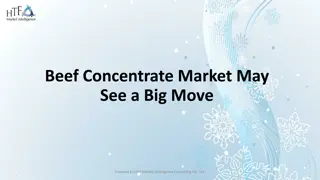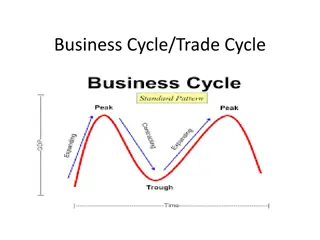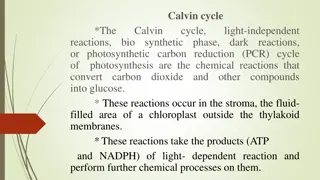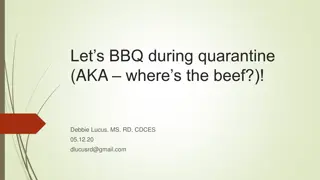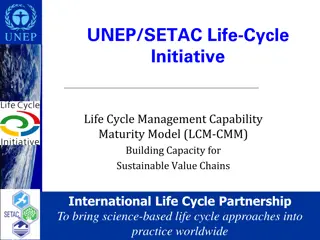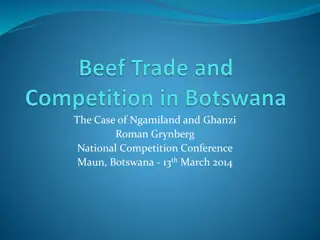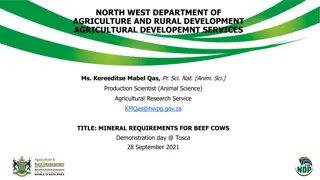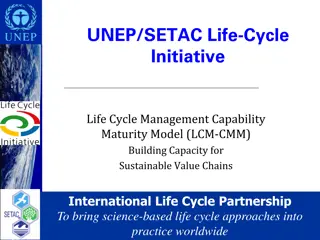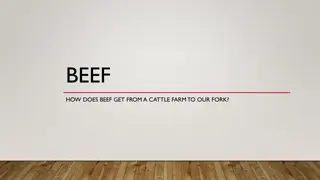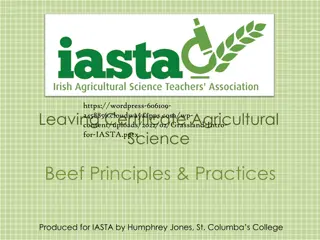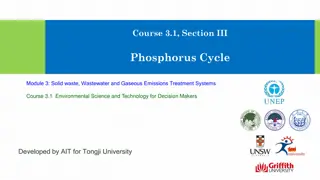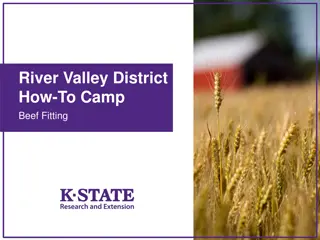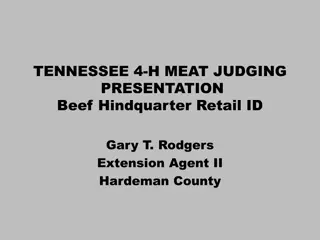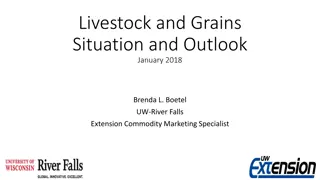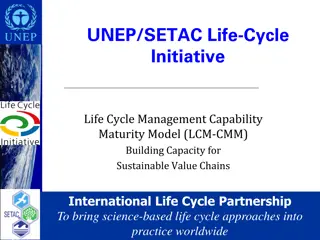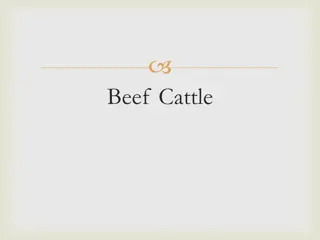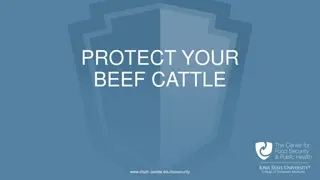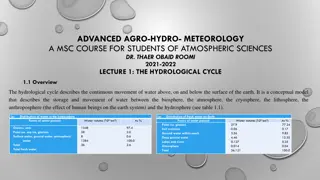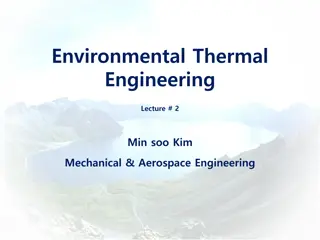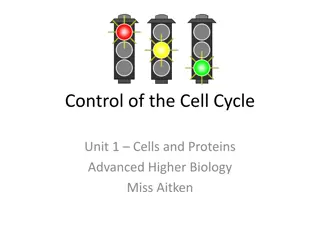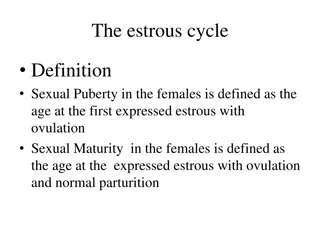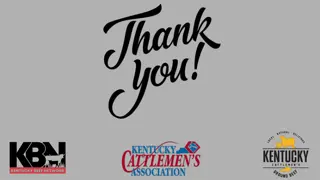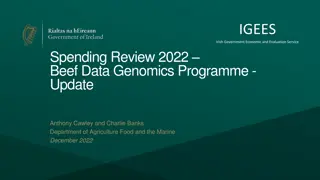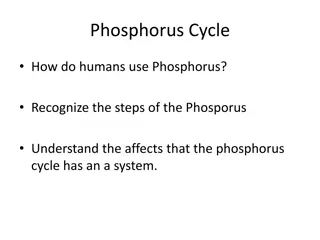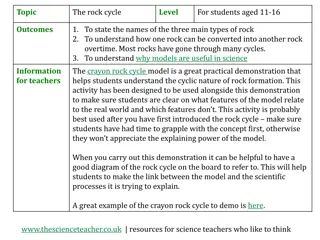Understanding Product Life Cycle Costing: A Comprehensive Analysis
Lifecycle costing involves tracking cost records of assets throughout their entire lives, optimizing asset usage at minimal cost. Product lifecycle costing accumulates a product's costs from inception to disposal, with stages like Introduction, Growth, Maturity, and Decline. It helps assess profitab
4 views • 19 slides
Understanding Different Classes of Beef Animals and Their Grading
Different classes of beef animals, including cow, bull, calf, ox, heifer, and more, are discussed along with their characteristics and purposes. The process of grading beef, which provides information on taste and palatability, is also explained. Additionally, cuts of beef and their cooking methods
0 views • 20 slides
Factors Affecting the Hydrological Cycle: Understanding Physical and Human Influences
The hydrological cycle is influenced by both physical and human factors. Physical factors such as relief, vegetation, basin size, rock type, soil type, and climate all play a role in shaping the movement of water through the cycle. Human activities like forestry, urbanization, deforestation, mining,
2 views • 20 slides
Understanding the Accounting Cycle Process
The accounting cycle is a comprehensive process that involves recording and processing all financial transactions of a company, from their occurrence to their representation in financial statements and closing of accounts. It is crucial for bookkeepers to manage the entire cycle, which includes step
0 views • 11 slides
Urea Biosynthesis and the Krebs-Henseleit Cycle in the Liver
Urea is synthesized in the liver through a series of enzymatic steps known as the urea cycle or Krebs-Henseleit cycle. This process involves converting toxic ammonia into urea, a less toxic and water-soluble compound that can be easily excreted in urine. The liver plays a crucial role in urea biosyn
1 views • 20 slides
Understanding Expected Progeny Differences (EPDs) in Beef Cattle Selection
Expected Progeny Differences (EPDs) in beef cattle breeding predict future offspring performance based on genetic merit. They help compare animals as parents and aid in selecting for traits like birth weight, weaning weight, and yearling weight. Combining EPDs with visual appraisal improves decision
0 views • 15 slides
Understanding the Cycle of Erosion: Applied Geomorphology Perspective
The Cycle of Erosion model, developed by Davis in the 1880s, explores the process of landmass upliftment, river erosion, and landscape transformation. The Normal Cycle of Erosion focuses on fluvial processes as the primary geomorphic agent, leading to the formation of peneplains. This cycle progress
0 views • 23 slides
Understanding the Accounting Cycle
The accounting cycle is a comprehensive process that involves recording and processing all financial transactions of a company, from their occurrence to their representation on financial statements and closing the accounts. This cycle, essential for bookkeepers, includes steps like transactions, jou
0 views • 11 slides
Impact of Climate Change on Beef Production: Insights from Research
Climate change significantly impacts beef production through various factors such as heat stress, nutritional stress, and altered disease patterns. Livestock are uniquely affected by climate change and also contribute to it through methane emissions. Adapting to changing weather conditions is crucia
0 views • 12 slides
Beef Concentrate Market ppt
Global Beef Concentrate Market Breakdown by Application (Food and Beverage Industry, Nutritional Supplements, Pet Food, Foodservice Sector) by Type (Liquid Beef Concentrate, Powdered Beef Concentrate, Paste Beef Concentrate) by Distribution Channel (
0 views • 8 slides
Understanding the Business Cycle and Its Phases
The business cycle, also known as the trade cycle, depicts the cyclical nature of economic activity with alternating periods of prosperity, recession, depression, and recovery. It involves fluctuations in production, prices, income, employment, exports, and imports. The cycle affects all industries
0 views • 15 slides
Understanding the Calvin Cycle in Photosynthesis
The Calvin cycle, also known as the light-independent reactions, is a crucial part of photosynthesis where carbon dioxide is converted into glucose. This cycle occurs in the stroma of chloroplasts and utilizes ATP and NADPH from the light-dependent reactions to produce sugars for plants. It consists
5 views • 15 slides
Ideal Reheat Rankine Cycle Analysis for Steam Power Plant
Analyzing the thermal efficiency and mass flow rate of an ideal Rankine cycle with superheat and reheat using steam as the working fluid. The cycle involves stages of expansion, reheating, and condensing to generate a net power output of 100 MW. Detailed calculations for states of the cycle are prov
1 views • 5 slides
Adapting Contest Strategies for Declining Solar Cycle 24 and Solar Cycle 25 Precursors
As Solar Cycle 24 rapidly declines, preparations for the subsequent Solar Cycle 25 are crucial. Insights on weak solar activity, potentially weak Cycle 25, and the impact on contest strategies are discussed. Improved DX propagation, reliable openings, and signal strengths to Europe and Japan, amidst
0 views • 12 slides
Let's BBQ During Quarantine: Where's the Beef?
Debbie Lucus, MS, RD, CDCES, shares tips for BBQing during quarantine. The article includes a fun BBQ image and provides contact details for Debbie. It also humorously asks, "Where's the Beef?" The content discusses BBQing ideas and recipes for a delicious at-home BBQ experience.
0 views • 19 slides
Reducing Emissions in the Beef Sector: Draft Report from Food Vision Beef Group Meeting
Draft report from the Food Vision Beef Group's fourth meeting on September 1, 2022, at Backweston focuses on planning to reduce emissions associated with the beef sector. The report contains 17 measures derived from discussions held over the past two months.
1 views • 25 slides
Recognizing Patterns of Dating Violence and the Cycle of Abuse
Understanding the phases of dating violence is crucial in recognizing and addressing abusive behavior. The cycle typically begins with tension building, leading to an explosion of abuse in various forms. This is followed by a honeymoon phase where the abuser apologizes and makes promises. However, t
0 views • 6 slides
Sustainable Value Chains and Life Cycle Management Capability
The UNEP/SETAC Life-Cycle Initiative focuses on building capacity for sustainable value chains through the Life Cycle Management Capability Maturity Model (LCM-CMM). It emphasizes implementing science-based life cycle approaches globally by transitioning from events to management systems, conducting
1 views • 12 slides
Sustainable Trade Solutions for Ngamiland's Beef Industry
The presentation discusses the challenges facing Ngamiland's beef industry due to Foot-and-Mouth Disease (FMD) and explores the potential of adopting a Commodity Based Trade (CBT) approach to revive the economy. By transitioning to CBT, Ngamiland could potentially expand its market access while addr
0 views • 9 slides
Mineral Requirements for Beef Cows Demonstration Day at Tosca
Essential minerals play a crucial role in the growth and reproductive performance of beef cows. Divided into macro and micro categories, these minerals are necessary for skeletal development, milk production, and overall body function. While some minerals are readily available in forage, supplementa
0 views • 20 slides
Life Cycle Management for Sustainable Value Chains: Building Capacity and Promoting Innovation
This content delves into the Life Cycle Management Capability Maturity Model (LCM-CMM) aimed at enhancing sustainable value chains globally. It emphasizes the importance of bringing science-based life cycle approaches into practical implementation to address global issues, international standards, c
1 views • 11 slides
Journey of Beef from Farm to Fork
Beef production involves a process starting from cattle farms where cows give birth to calves, followed by the growth stages including nursing, weaning, auction, grazing, feeding in feedyards, and eventually harvesting in processing facilities. The final beef cuts are distributed to supermarkets and
0 views • 11 slides
Overview of Beef Farming in Ireland
The beef industry in Ireland plays a vital role in the country's agricultural economy, with millions of beef animals producing a significant amount of beef annually. However, despite its importance, beef farming has the lowest income per hectare compared to other farming types in Ireland. This overv
0 views • 72 slides
Fuel Cycle Analysis Toolbox: Enhancing Understanding and Optimization
This presentation focuses on the analyses and evaluations essential for assessing the potential of a fuel cycle, emphasizing different time scales, system sizes, objectives, and audiences. It discusses the need for coupled analyses, various tools required, and opportunities for improvement through i
1 views • 11 slides
Understanding the Phosphorus Cycle in Environmental Science
Exploring the intricate processes of the phosphorus cycle, this module delves into how solid waste, wastewater, and gaseous emissions are treated within environmental science and technology frameworks. The discussion covers the distinctive aspects of the phosphorus cycle, its impact on land and wate
0 views • 13 slides
Beef Showmanship and Fitting Tips for Successful Campers
Explore essential tips for successful beef showmanship and fitting at camp in the River Valley District. Learn how to perfect your routine, enhance your skills, and excel on show day with expert guidance and insights. Whether you're a beginner or seasoned camper, these tips will help you elevate you
0 views • 4 slides
Tennessee 4-H Meat Judging Presentation: Beef Hindquarter Retail Cuts Identification
In this presentation featuring beef hindquarter retail cuts, students learn to identify different primal and retail cuts of beef such as Loin, Round, Sirloin, and Flank. Each cut is displayed with accompanying features to aid in recognition and understanding. The presentation helps students develop
0 views • 32 slides
Role of Cell Cycle in Nanoparticle Uptake and Dilution in Cell Population
The cell cycle plays a crucial role in the cellular uptake and dilution of nanoparticles within a cell population. This process involves different phases such as G1, S, G2, and M, each with specific functions related to cell growth, DNA synthesis, protein synthesis, and cell division. Understanding
0 views • 20 slides
Livestock and Grains Situation and Outlook Analysis for January 2018
Brenda L. Boetel, a Commodity Marketing Specialist, evaluates the Livestock and Grains situation for January 2018. The analysis covers key aspects such as Commercial Meat & Poultry Production, Meat Disappearance in the US, Pork Production, Beef Export Trends, and Future Predictions for the Cattle In
0 views • 25 slides
Sustainable Value Chains and Business Context in Life Cycle Management
The UNEP/SETAC Life-Cycle Initiative focuses on building capacity for sustainable value chains worldwide through the Life Cycle Management Capability Maturity Model. Understanding the competitive, environmental, and business contexts is crucial for implementing science-based life cycle approaches ef
0 views • 15 slides
Overview of Beef Cattle Breeds and Characteristics
In the United States, there are over 80 recognized breeds of beef cattle, each with its own advantages and disadvantages. British breeds like Angus and Hereford offer low birth weight and high fertility, while European breeds like Charolais and Simmental excel in growth rate and milk production. Oth
0 views • 24 slides
Protect Your Beef Cattle: Prevent Diseases and Ensure Animal Health
Diseases can harm the health of beef cattle and lead to costly consequences. Learn how to protect your herd by taking biosecurity measures to prevent the spread of diseases. This material, developed with support from USDA, emphasizes the importance of proactive steps to safeguard your beef cattle.
0 views • 5 slides
Understanding the Hydrological Cycle in Advanced Agro-Hydro-Meteorology
The hydrological cycle involves the continuous movement of water on, above, and below the Earth's surface, encompassing various realms such as the biosphere, atmosphere, cryosphere, lithosphere, and hydrosphere. This cycle describes the storage and movement of water within different Earth systems an
0 views • 14 slides
Fundamentals of Environmental Thermal Engineering in Mechanical & Aerospace Engineering
Explore the key concepts of environmental thermal engineering in Mechanical & Aerospace Engineering, covering topics such as the Carnot cycle, actual vapor-compression cycle, principles of the vapor-compression cycle, Carnot heat engine, refrigeration cycle, and coefficient of performance. Understan
0 views • 51 slides
Understanding Cell Cycle Control in Biology
Maintaining control of the cell cycle is crucial to producing healthy daughter cells and preventing mutations that can lead to degenerative diseases like Parkinson's or cancer. Cell cycle checkpoints at G1, G2, and Metaphase ensure the cell meets specific requirements before progressing to the next
0 views • 11 slides
Understanding the Estrous Cycle in Female Animals
The estrous cycle is a reproductive phenomenon in female animals, consisting of different phases like proestrus, estrus, metestrus, and diestrus. This cycle determines the periods of sexual receptivity and fertility in various species such as cows, ewes, sows, and mares. Factors like season, nutriti
0 views • 20 slides
Kentucky Cattlemen's Association Long-Range Plan Overview
Kentucky Cattlemen's Association has outlined a comprehensive long-range plan for 2020-2025, focusing on cultivating value-added marketing opportunities, strengthening research and outreach, enhancing engagement and advocacy, and developing organizational infrastructure. The plan includes strategies
1 views • 11 slides
Update on Irish Government's Beef Data Genomics Programme
The spending review for 2022 provides key findings and recommendations on the Beef Data Genomics Programme in Ireland. The analysis shows positive trends in genetic gain, with recommendations for a new iteration focusing on data-driven schemes and holistic approaches to improve sector sustainability
0 views • 4 slides
Understanding the Phosphorus Cycle and Its Impact on Ecosystems
Humans use phosphorus in various ways, from being a vital component in DNA, RNA, and cell membranes to its role in energy transfer processes. The phosphorus cycle involves steps such as weathering of rocks, phosphate mining for fertilizers, excretion/decomposition, and geologic forces. However, exce
0 views • 8 slides
Exploring the Rock Cycle Using the Crayon Rock Cycle Model
This educational resource focuses on teaching students aged 11-16 about the rock cycle, including the types of rocks, how rocks transform over time, and the importance of models in science. It introduces the crayon rock cycle model as a hands-on demonstration to help students grasp the cyclic nature
0 views • 4 slides

